| Construction Rating: | starstarstarstarstar_border |
| Flight Rating: | starstarstarstar_borderstar_border |
| Overall Rating: | starstarstarstarstar_border |
| Published: | 2010-01-27 |
| Length: | 18.00 inches |
| Manufacturer: | Dr. Zooch  |
| Skill Level: | 3 |
| Style: | Scale |
 (Contributed - by Stu Young - 01/27/10)
(Contributed - by Stu Young - 01/27/10)Brief:
Scale, parachute, 18mm single-staged
Construction:
The instructions were clear, and full of sarcastic humor that made me laugh out loud at times. I won't spoil the surprise by quoting my favorites. Suffice it to say, Dr. Z. anticipated any bone-headed mistakes, and warns the builder against making them, which saved my bacon more than once!
This is definitely a builder's kit. There are no laser-cut fins or cardboard punch-out reinforcing bulkheads for the strap-on boosters. You cut out templates using scissors (or a hobby knife), trace them on balsa stock, then cut out the parts.
There are lots of card-stock shrouds to be cut out and formed (strap-on boosters, engine nozzles, adapter between the spacecraft shroud and the second stage, the conical top of said shroud, etc.). The only trouble I had was with the strap-ons. Despite doing my best to pre-curl them, and using the wooden dowel in the kit for that purpose, I still ended up with wrinkles in the boosters, though I've seen worse. Some of my club members have discussed using thin styrene sheeting and CA glue to form perfect shrouds; I'll upload a "tip" later with more details.
Dr. Z. instructs one to cut 1/8" strips of balsa, and glueing same longitudinally in pairs on the core stage, to use as glueing guides for the strap-ons. He also provides a template on cardstock to help align the boosters by sight. For some reason, this didn't work for me; my first glueing attempt resulted in boosters which were not equidistant around the core stage. Fortunately, the glue hadn't dried yet, and I started over, just eye-balling the alignment this time. I was much happier with the outcome.
Despite the clear instructions, it was at this point that I made one bone-headed mistake, glueing a strap-on right over the motor retention hook. This prevented the hook from bending enough to admit motors. Fortunately, I had a spare motor hook from another model, and I was able to retrofit it between 2 of the strap-ons.
Dr. Z. also provides a template for a sleeve to help build the interstage strutwork. I ended up not using it; instead, I used a printed wrap from a Soyuz paper model (details below) to simulate the strutwork. I decided to do this after counting the number of "V" struts on the wrap: 10, as opposed to 5, which were to be assembled per the instructions. Unfortunately, I'm not satisfied with the outcome. I thought it might look more realistic; but my daughter said it best, when I showed her my handiwork: "It just looks like you glued a printed wrap there" (imagine that?!). Dr. Z. would say that I'm a "squirming hatch-blower."
This was definitely the most labor-intensive kit I have built to date (well, actually completed - unlike my Mars Lander...). Yet, the detailed and thorough instructions and illustrations made it easy. Just follow the step-by-step approach, measure twice and cut once, etc., and it'll all get done.
Finishing:
The balsa in this kit (and in my other Dr. Z. kit, the Titan III SLV) has moderately coarse grain. In a kit built
as stock, this would be most apparent on the nose cone (right under the launch escape tower) and on the fins.
(Incidentally, the nose cone already has the right amount of ballast installed). Expect to use at least two coats of
some sort of sanding sealer or primer. I was planning to use a paper skin over the fins, but got into a hurry to finish
the Soyuz before my club's January launch, and just painted them with a silver paint marker. I'll probably go back and
refinish them better at a later date.
I wanted the Soyuz to look like it was fuelled on the pad, and covered with frost due to LOX. Using green masking tape, I masked off the areas which would be frost-covered (using Peter Alway's Rockets of the World as a guide), and used, which was an almost perfect match for the paper wraps. After this paint dried, I used blue masking tape to mask the areas which would not frost over (the core stage under the transition to the second stage, and areas on the strap-ons; in real life, these would be the areas over the kerosene tanks). By using blue tape, I ensured that there would be some bleed-through of the flat white onto the green areas, to simulate the uneven demarcation between frost and bare painted metal. The effect came out better than I expected.
No decals are supplied. If one wants to portray this kit as an early Soyuz, no decals are needed. I had the idea to portray my model as a current Soyuz. Using paper "skins" from a Soyuz paper model (available for free from the MARS website, http://www.marscenter.it/veicol.asp?pa=6051), my model is now festooned with insignia from Energia (the manufacturer of the Soyuz), Roskosmos (the Russian Federal space agency), the European Space Agency, Italian and Russian flags, etc. I also didn't have to paint the second stage or the spacecraft adapter, other than clear-coating the paper skins with Krylon glossy clear.
The manufacturer gives the weight of the completed kit as 2.28 oz. Mine weighed in at 2.6 oz., which I thought wasn't too bad considering my extensive use of the paper skins.
Construction Rating: 4 out of 5
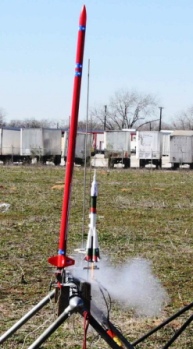 Flight:
Flight:
So far, the Soyuz has flown once, at the Alamo Rocketeers monthly launch on 1/9/10. I loaded up a B4-2 for her
maiden flight. She flew to a nice altitude, with a little bit of roll.
Recovery:
There is barely enough room for a parachute in this kit (at least for my mediocre chute folding/rolling skills).
One has to be careful grasping the rocket by the strap-ons; don't squeeze them too hard! Also, the torque imparted to
the strap-ons when packing the chute could pull the boosters loose if one gets too enthusiastic. I could feel the
strap-ons flex, so I was gentle. Despite this, a fin and a card-stock nozzle popped off; these were fixed in the field
with CA. Accordingly, I didn't attempt to use the Dr. Z.-supplied trashbag chute, which would be suitable for a model
with a larger diameter. I used a Hartle Engineering Thermal Rider chute which I had already assembled and stored in my
range box. Dr. Z. recommends saving the wooden dowel from the kit (used for rolling the strap-ons) for pushing the
chute down into the body tube; I found that to be very useful.
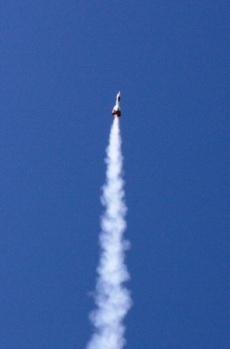
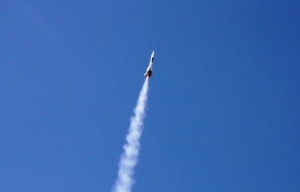
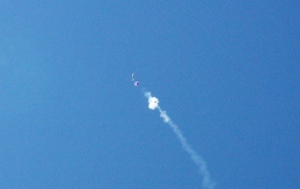
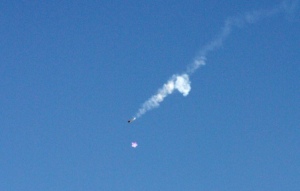
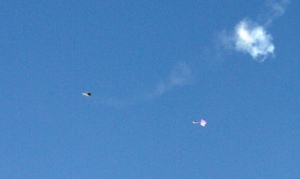
My one launch so far ended in a separation. Dr. Z. supplies a length of Kevlar® thread, which is attached to the motor mount, and to elastic at the other end. Despite using a double knot and CA glue, the Kevlar® thread was pulled loose from the motor mount. The "second stage"/"spacecraft" descended nicely on the chute, while the "first stage" descended at a moderate clip and in a flat roll, landing on its side in the grass. Two fins broke off on landing, and one was lost (no big deal; the kit had plenty of balsa left, and I had saved the fin template). It will fly again, but this time I think I'll use the good 'ol Estes trifold paper mount, high in the body tube.
Flight Rating: 3 out of 5
Summary:
I'm glad I got this kit. I tried to scratch-build a Soyuz a couple of years ago. I started with a paper model of
a Vostok (which flew O.K., but not too high, on A10-Ts), then added the second stage and spacecraft adapter from a
Soyuz paper model. It was too heavy, and crashed. The Dr. Z. Soyuz flies very well on B motors. Recovery so far is
problematic, but I'm confident that will be sorted out. I also plan to go back and build the actual strut-work between
the stages; believe me, it just looks better that way.
Overall Rating: 4 out of 5
Other Reviews
- Dr. Zooch Soyuz By Chan Stevens (February 29, 2008)
Brief: This is a recent addition to the fine line of Zooch scale-like kits that seem to defy the laws of physics and economics, packing terrific detail, scale accuracy, and reliability into a small box. The kicker is that the finished rocket can even fit back in the box for storage. This particular design is one of the Russian workhorses--a Soyuz spacecraft mounted to a 20-engine ...
- Dr. Zooch Soyuz By Craig Zicafoose (February 26, 2008)
This is the latest offering from Dr. Zooch, a semi-scale version of the manned Russian spacecraft, Soyuz. It is powered by a single 18mm motor and comes down with parachute recovery. This model does require some patience and skill--it is not a beginner's kit. I'd rate this at a 3-4 skill level. All parts included in the kit are good quality and include: 1 T-20 core tube 1 T-50 ...
 |
 |
Flights
 |
 |
J.A.L. (February 22, 2010)
Sponsored Ads
 |
 |












R.J.J. (August 13, 2008)